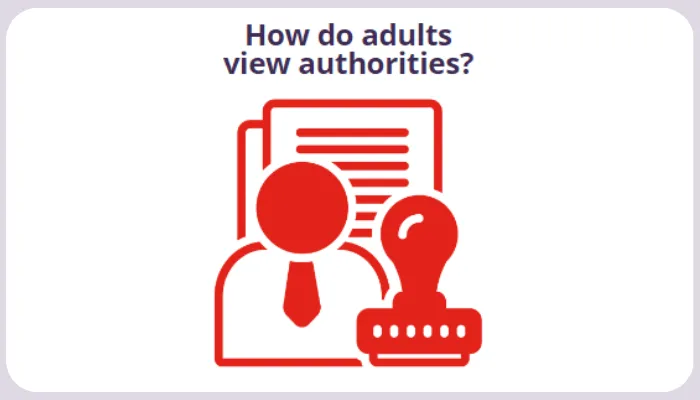
How do adults view authorities? Are feelings about authorities the same across our diverse society?
How do adults view authorities?
Are feelings about authorities the same across our diverse society?
Adults have different opinions about people in authority, like the government, police, and teachers. These opinions are influenced by many things, such as their background, experiences, and what's happening in the world.
Let's look at some of the reasons why adults might think differently about authorities to help you to understand why some families might be mistrustful of you and the wider support available to them.
Cultural Background
Where someone grows up can make a big difference in how they see authorities.
• Collectivist Cultures: In countries like China or Japan, people often see authorities as essential for keeping society peaceful and organised. Respecting authority is a big part of the culture.
• Individualist Cultures: People focus more on personal freedom in places like the United States or many European countries. They could be more likely to question or challenge authority.
Personal Experiences
What happens to someone can change how they feel about authorities.
• Positive Interactions: If an adult has had good experiences with authorities, like fair treatment from police or help from a teacher, they're likely to trust and respect them.
• Negative Interactions: If an adult has faced unfair treatment, such as being discriminated against by police or mistreated by a teacher, they might distrust or dislike authorities.
Socioeconomic Status
A person's economic background can also influence their views on authorities.
• Higher Socioeconomic Status: People who are well-off financially might see authorities as protectors who keep their world stable and safe.
• Lower Socioeconomic Status: People who struggle financially might see authorities as uncaring or harmful, especially if they feel neglected or mistreated.
Race and Ethnicity
In many places, race and ethnicity play a significant role in how people view authorities.
• Minorities: In the United States, for example, many African Americans and other minorities have faced discrimination from authorities. This makes them more likely to distrust the police and government.
• Majority Groups: People without such discrimination might have a more positive view of authorities.
Political Beliefs
A person's political views can also shape their opinions about authorities.
• Conservatives: People with conservative views usually believe in tradition and order. They are more likely to trust authorities.
• Liberals/Progressives: People with liberal or progressive opinions often focus on fairness and equality. They might be more sceptical of authorities if they see them as unfair or oppressive.
Current Events
What's happening in the world right now can quickly change how people feel about authorities.
• Scandals and Crises: If there's a big scandal or crisis, like police brutality or government corruption, people might lose trust in authorities.
• Positive Actions: If authorities handle a situation well, like managing a natural disaster or creating fair laws, trust in them might increase.
Diverse Feelings Across Society
People's feelings about authorities aren't just different between countries—they can also be very different within a country.
• Trust and Distrust: City people might feel differently about authorities than in rural areas.
• Generational Differences: Younger people might be more likely to question authority than older people.
• Specific Institutions: Someone might trust the healthcare system, not the police, or vice versa.
We all have many different views about authorities, influenced by culture, personal experiences, economic status, race, political beliefs, and what's happening around us. This means that opinions about authorities can be very diverse and sometimes even divided.
While some people see authorities as necessary and helpful, others see them as unfair or harmful. Understanding these different perspectives helps you to understand why that particular family might be distrustful of your offer of help, or the opposite, expect and request over and above your role.
AUTHOR:- Iona has nearly 10 years of experience supporting nurseries and childminders in curriculum planning, leadership, and safeguarding. Her writing is informed by public information and sector insight, aiming to provide accessible, practical support for professionals working with children. She is part of the On the Button team, helping deliver Well-being, Safeguarding and Complaint Management Software that empowers practitioners to identify concerns early and act confidently.
On the Button provides innovative software tailored to the needs of the early years sector, with a strong focus on EYFS well-being and early years safeguarding. Our tools help senior practitioners to confidently track concerns, maintain robust records, and respond effectively — all while meeting statutory guidance. From early years complaint management to team-wide safeguarding alerts, our platform puts children's safety and emotional health first.
